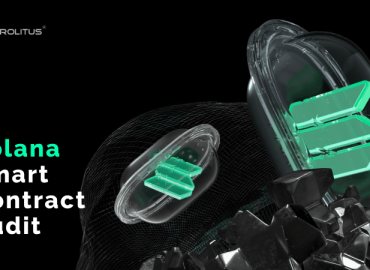Decentralized Finance is an emerging financial technology disrupting traditional financial methods through cryptocurrencies. DeFi harnessed the power of smart contracts, essentially pieces of code that execute upon meeting predefined conditions.
Since smart contracts automate the entire process to make it free from human intervention, security audits become critical to check for any errors and vulnerabilities. As a result, smart contract security audits are widespread in the DeFi space. Most blockchain projects get their smart contracts audited by the best companies to protect their funds.
People are aware as they understand audits are essential for any project. However, not everyone dives into the lines of code. This blog will help you make informed decisions while learning the methods and tools used in smart contract auditing.
What is a Smart Contract Audit?
A smart contract security audit helps to find any errors or vulnerabilities by examining a project’s smart contract code. Understanding the likelihood and critical nature of contract flaws in the code is essential.
A smart contract security audit examines the smart contracts of a project in depth. Since DeFi projects handle real money in terms of millions, it makes security audits more valuable for DeFi projects. Generally, an audit follows a four-step process.
First, the smart contracts go to the audit team for the initial analysis. The audit team checks the code and presents its findings to the project. Then, the project team makes changes based on the issues found. Finally, the audit team releases its final report, considering any new changes or errors.
As users become aware of the prevalent hacks around them, many crypto users consider smart contract audits critical before investing in new DeFi projects. As a result, platforms are keen to consume services from key audit providers to make their audits more valuable in investors’ eyes.
Why is it Essential to Perform a Smart Contract Security Audit?
Security is a significant concern for all protocols for smart contract deployment. A small hack or error in security, inefficiency, and misbehavior can erode the entire amount secured by smart contracts. Furthermore, it could incur high costs to the protocol if it chooses to ignore the security audit.
Even minor coding flaws can result in the theft of enormous quantities of money. For example, the DAO breach that happened a few years back lost around $60 million in Ether and resulted in a hard fork.
Many examples exist in the DeFi space, where businesses have lost millions due to prevalent errors. Hence, companies are concerned about their deployment due to the irreversible nature of smart contracts. Therefore, smart contract auditing is a critical requirement for the following reasons:
- It is best to avoid costly errors by auditing your code early in the development lifecycle. This practice can help you avoid potentially fatal flaws after launch.
- To eliminate spurious results, expert reviewers manually double-check your code.
- It is critical to keep an eye on any security flaws to prevent security attacks on your code.
- A smart contract security audit assures the owners of decentralized products that their code is secure.
- The smart contract auditing process helps to conduct assessments that improve your development environment.
- A vulnerability report provides an executive summary, vulnerability details, and mitigation advice.
How do smart contract audits work?
The process of a smart contract audit is reasonably standard among audit providers. We will discuss the approach taken by an auditor in the following steps.
- Determine the scope of the audit. The audit team understands the motive behind the smart contract and its overall architecture.
- The audit team then provides an initial quote based on the amount of work needed.
- Run tests. The audit team runs the tests, both automated and manual, to find the errors and vulnerabilities in the code.
- The team creates the first draft of the report with errors found and provides it to the project team for feedback.
- Last, the team publishes the final report and sends it back to the project team, which addresses the raised issues.
Smart contract audit methods
Gas efficiency
Smart contract audits also look at improving the overall efficiency of the code. The audits checks for the series of transactions that the code makes to perform a function. Since gas fees on specific networks are relatively high, efficient contracts can save a lot on transaction costs.
Smart contract audit companies have a keen eye for optimizing the performance of smart contracts. Developers check for any inefficient steps to prevent failure of the contract.
Contract vulnerabilities
Smart contracts are the backbone of any DeFi application. The lines of code store all the information, including funds, making it essential to undergo auditing. Unfortunately, not every issue can be easily seen; many exploits involve advanced techniques and strategies to drain funds.
To counter these issues, auditors start the testing process and simulate malicious attacks on the smart contract. The tests checks for some of the common vulnerabilities that include:
- Reentrancy issues arise when a smart contract makes an external call to another external contract before any effects are resolved. It can result in indefinite communication as it interacts with it in ways it shouldn’t be able to.
- Since the execution of a smart contract is on the miner’s side, they can manipulate the execution result if a contract’s logic is dependent on the current time.
- During an arithmetic operation, a smart contract can provide incorrect amounts due to integer overflows and underflows.
- Smart contracts code can forewarn market purchases or sales if their code is poorly structured. Hence, people can benefit from this information.
Audits check for platform flaws and even check for the network hosting the contracts or API interacting with the DApp. It helps prevent a DDoS attack or compromise in the website’s UI, which can allow users to connect their wallets to malicious blockchain applications.
How much does a smart contract audit cost?
The charges for a smart contract audit depend on the intricacy of the code. On average, the audit providers charge between $5,000 and $15,000. The auditing firm produces a report containing the details of the potential flaws to improve its security.
The team looks at contract dynamics to see how they represent modern security tendencies. For example, smart contract audit services are expensive as the auditors check the code row by row, which is time-consuming and complex.
Large projects or protocols have long code that can consume a month of the auditing team. After the initial audit is done, the client receives recommendations for fixes to implement and determines the time it takes to correct errors.
What is an audit report?
An audit report contains the essential findings and issues in the code and is provided at the end of the audit process. They usually categorize issues by severity, such as minor, major, critical, etc. The audit report lists the issue’s status to determine whether or not the issues are rectified.
An audit report also contains an executive summary, examples of redundant code, and all the errors present in the code. The project team performs the required edits before the final report is released.
Final Thoughts
Smart contract audits are a lifesaver for investors and users. They help to identify critical faults and improve the overall efficiency of smart contracts. As a user, it is also essential to read the audit and understand the severity of potential issues. As always, make sure that any investment decision considers all the relevant information.
Prolitus Smart Contract Auditing Service
Prolitus has a suite of industry-leading tools for analyzing blockchain security. Their experienced team provides a hands-on review to ensure your smart contract applications are ready to launch. Prolitus has helped numerous enterprises safeguard their investments by giving foolproof security audits for their smart contracts.
Our auditors review the code for common vulnerabilities and perform a security assessment of the contract’s environment. The expert team provides a comprehensive and cost-effective audit, ensuring you get the best value for your money.
Get in touch with our team to learn more about Smart Contract Audit Services.
Frequently Asked Questions (FAQs)
What is a smart contract security audit?
A smart contract security audit helps to find any errors or vulnerabilities by examining a project's smart contract code. They are essential for a protocol as smart contracts are the backbone and hold millions of users' funds.
Why do we need a smart contract audit?
A smart contract security audit provides a full-fledged analysis of the errors and vulnerabilities to safeguard funds invested. Since we cannot reverse the transactions on the blockchain, funds cannot be retrieved once stolen.
How long does a smart contract audit take?
The smart contract audit process takes between 2 and 14 days, depending on the complexity of the project, smart contract size, and urgency. For large projects or protocols, the audit may take up to 1 month.





